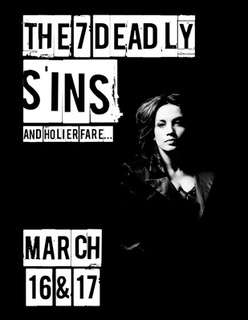|
Back
The 7 Deadly Sins (and Holier Fare) Toronto
Gallery 345
03/16/2012 - & March 17, 2012
Steve Reich: Piano Phase
Benjamin Britten: Canticle II: Abraham and Isaac
John Adams: Hallelujah Junction
Kurt Weill: Die sieben Todsünden der Kleinbürger
Lindsay Sutherland Boal (Anna I), Tina Fushell (Anna II), Giles Tomkins (Mother), Graham Thomson (Father), Derek Kwan (Brother I), Andrew Love (Brother II), Christopher Mayell (Abraham), Erin Lawson (Isaac)
Christopher Mokrzewski, Daniel Pesca (Pianists)
Matjash Mrozewski, Kate Franklin (Dancer/choreographers), Joel Ivany (Director)

Against the Grain Theatre got its start just a couple of years ago when a group of talented young people got together to create their own opportunities in the field of music drama. Their highest profile success has been a production of Puccini’s La Bohème (in English, with piano accompaniment) performed in a bar. The delighted audience found itself not only attending the opera but actually participating in it. This production will be revived for the second time in coming months.
Their latest show, The 7 Deadly Sins (and Holier Fare) was staged in an art gallery located in one of Toronto’s many ex-industrial buildings adapted to what are now known as the creative industries. Gallery 345's cramped, L-shaped space poses challenges as a performing venue - but (a big plus) it does have two grand pianos.
The program opened with Steve Reich’s Piano Phase (composed in 1967) for two pianists who start the piece playing a repetitive cycle in synchronization, but then one starts falling behind, first by just one note, then two, until his part comes around to re-synchronize with the other. Dancer/choreographers Kate Franklin and Matjash Mrozewski devised a performance for themselves that turned out to be an extremely clever counterpart to the music. Bob Fosse once created a dance for performers whose shoes were nailed to the stage; Franklin and Mrozewski had a bit more leeway on the tiny platform available, but not much. The only element of decor was their shadows projecting at an expressive angle on the bare back wall.
Benjamin Britten’s second canticle Abraham and Isaac has been described as a mini-opera (it was composed between Billy Budd and Gloriana). Personable young singers Christopher Mayell (Abraham) and Erin Lawson (Isaac) gave in intense, well-prepared performance (with Christopher Mokrzewski on the piano). Here again synchronization (this time of tone) is the tricky feature. When singing God’s lines, the two singers’ voices join to create an eerie hallucinatory effect. This was the “holier fare” of the evening. I thought it odd fare for a cabaret-style setting - but it worked just fine.
This was followed by John Adams’ Hallelujah Junction (composed in 1996) again featuring the two pianists in the 20-minute, three-movement work that shares many characteristics with the Reich piece. There was no choreography for this (which has been used for a dance work by Peter Martins). Once again Mokrzewski and Pesca gave an intensely focused performance.
The second half of the evening was devoted to the Bertolt Brecht/Kurt Weill Die Sieben Todsünden der Kleinbürger (“The Seven Deadly Sins of the Petty Bourgois”) given the full ballet chanté treatment. Ballet chanté (“sung ballet”) as a genre has logistical challenges and as a result is not plentiful. This work frequently appears as a showpiece for soprano and orchestra, with one singer voicing both Anna I (composed originally for Lotte Lenya) and Anna II (originally choreographed by George Balanchine for Tilly Losch). Here we had Lindsay Sutherland Boal as the cynical, complicit Anna I; she is a classically-trained singer who has adopted cabaret as her metier which is pretty much the ideal background for the role. Anna II is the victim of the piece and dancer Tina Fushell gave the character’s few short utterances an effective undercurrent of resentfulness. The four men portraying the Annas’ hypocritical family played their brief roles to the hilt. In addition to his deft direction, Joel Ivany also devised surtitles for us.
Next up for Against the Grain: Britten’s The Turn of the Screw at the Helen Gardiner Phelan Playhouse, one of the theatres at the University of Toronto.
Michael Johnson
|